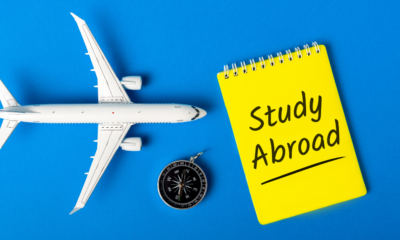Abroad education
Decoding MS in the USA: Your Budget Guide for Indian Students

Decoding MS in the USA: Your Budget Guide for Indian Students
Embarking on the journey of pursuing a Master’s degree in the USA is a significant step towards academic and career growth. However, understanding and preparing for the associated costs is crucial for a smooth transition. In this guide, we break down the expenses, providing valuable insights for Indian students planning to pursue MS in the USA.
EXPENSES FOR MS IN USA WHILE IN INDIA
- Graduate Record Examination (GRE) Exam Fee: Initiating your MS journey often starts with the GRE exam, a pivotal factor in the application process. Understanding the importance of thorough preparation, the exam fee stands at $220 (INR 22,500). Additionally, some may opt for a retake, incurring an additional $220 (INR 22,500).
- You can skip the GRE but not TOEFL or IELTS: While the GRE might be optional for some applications, TOEFL or IELTS is mandatory. Consider these exams as your passport to the United States. The TOEFL exam costs $200 (INR 16,900), and the IELTS is priced at $195 (INR 16,200).
- Applying to US universities: Application fees range from $50 (INR 4,150) to $100 (INR 8,300) per university. Considering additional costs for sending official test scores (GRE and TOEFL) through ETS, an average application expense amounts to $110 per university. For 10 universities, this totals $1,100 (INR 91,400).
- Other Expenses During Applications:
a) Counselling: Seek professional guidance at an average cost of Rs. 25,000 (Exempted for 5Lands overseas patrons)
b) Documents and Dispatch: Expenses for transcripts, bank statements, affidavits, and dispatching them to universities approximate around Rs. 12,000.
c) Miscellaneous Charges: Varied charges like late registration, rescheduling, etc., may incur, amounting to approximately $20-$160 each (INR 1,680-13,300)
5.VISA: Upon receiving your I20, essential for your stay in the US, VISA procedures commence. The VISA fee is $160 (INR 13,300), followed by the SEVIS fee at $200 (INR 16,600).
6.Flight Tickets: Economy class airfares range from Rs. 60,000 to Rs. 80,000 for a one-way trip and Rs. 1,20,000 to Rs. 1,60,000 for a return journey.
EXPENSES FOR MS IN USA WHILE IN USA
- Tuition Fee: Varied across universities and courses, the average tuition fee is USD 40,000 (INR 33,00,000) for a two-year MS program. Scholarships or financial aid may reduce these costs.
- Living Expenses: Living expenses, influenced by factors like location and housing, average between $500 to $1100 per month. Over a 2-year course, this totals around $16,000 (INR 13,30,000).
Table: Summary of Expenses (All amounts in INR)
| Expense | Amount |
| GRE Exam Fee (1 attempt) | 22,500 |
| GRE Retake | 22,500 |
| TOEFL Exam | 16,900 |
| IELTS Exam | 16,200 |
| Application Fee per University | 9,140 |
| Documents and Dispatch | 12,000 |
| Miscellaneous Charges (Estimate) | 11,840 |
| VISA Fee | 13,300 |
| SEVIS Fee | 16,600 |
| One-way Flight (Avg.) | 80,000 |
| Return Flight (Avg.) | 1,60,000 |
| Tuition Fee (2-year program) | 33,00,000 |
| Living Expenses (2 years) | 13,30,000 |
Conclusion: Understanding the intricacies of MS expenses is pivotal for a successful academic journey. At 5Lands Overseas Consultancy, we offer personalized guidance to help you navigate through these costs, ensuring a smooth transition towards your educational aspirations.
For more guidance call us on 7416905590

Abroad education
Study Abroad 101: Common Misconceptions Explained

Study Abroad 101: Common Misconceptions Explained..

Key Highlights
- Studying abroad offers opportunities for international education and the chance to gain a global perspective.
- It allows for cultural integration, where students can immerse themselves in a new environment and learn from different cultures.
- Studying abroad also provides opportunities for professional development, as students can gain valuable skills and experiences that will benefit them in their future careers.
- Academic quality is another important aspect of studying abroad, as many universities and institutions offer high-quality programs and courses.
- Overall, studying abroad is a transformative experience that offers a wide range of benefits for students.
Debunking Study Abroad Myths
Studying abroad is often perceived as an unattainable dream due to several common myths and misconceptions. In this section, we will debunk these myths one by one and provide a more accurate understanding of the study abroad experience.
Myth 1: Only the Wealthy Can Afford to Study Abroad
One of the most common misconceptions about studying abroad is that it is only for the wealthy. However, this is far from the truth. While studying abroad can be expensive, there are various scholarships and financial aid options available to make it more affordable for students from all backgrounds.
Many universities and organizations offer scholarships specifically for international students, which can cover a significant portion of the tuition fees. Additionally, financial aid packages, grants, and loans can also help students finance their study abroad experience. With careful planning and research, studying abroad can be an affordable option for students who are determined to pursue this opportunity.
Myth 2: Studying Abroad Is Unsafe
Another common myth about studying abroad is that it is unsafe. However, studying abroad can be just as safe as studying in your home country, if not safer. Universities and study abroad programs prioritize the safety and well-being of their students, providing support services and resources to ensure a secure environment.
Moreover, studying abroad offers a unique opportunity for cultural integration and the development of a global perspective. By immersing yourself in a new culture, you gain a deeper understanding of different customs, traditions, and viewpoints. This exposure fosters tolerance, empathy, and cross-cultural communication skills, which are essential in an increasingly interconnected world.
Understanding the True Costs of Studying Abroad
Studying abroad comes with certain costs, but it is important to understand the true expenses involved to make an informed decision. In this section, we will discuss the various costs associated with studying abroad and provide insights on how to manage them effectively.
Myth 3: Scholarships Are Rare and Insufficient
One common misconception about studying abroad is that scholarships are rare and insufficient to cover the costs. However, there are numerous scholarships available for international students, and with careful research and planning, students can find financial aid options that suit their needs. Some key points to consider are:
- Many universities and study abroad programs offer scholarships specifically for international students.
- There are also external scholarship opportunities provided by organizations and foundations.
- Cost of living can vary from country to country, and students should factor this into their budgeting.
- It is important to complete the scholarship application forms accurately and submit them on time.
By exploring different scholarship options and planning ahead, students can secure financial aid that will make studying abroad more affordable.
Myth 4: You Need to Be Fluent in a Second Language
Another common misconception is that you need to be fluent in a second language to study abroad. While knowing the local language of your study destination can certainly be beneficial, it is not always a requirement. Many universities offer courses taught in English, especially at the undergraduate and postgraduate levels. Additionally, study abroad programs often provide language courses to help students develop basic proficiency in the local language.
Studying abroad can actually be an excellent opportunity to improve your language skills by immersing yourself in the local culture and practicing your language abilities with native speakers. It is important to have a willingness to learn and adapt, as well as an open mind to embrace new cultural experiences.
The Academic Truths Uncovered
In this section, we will uncover the academic truths of studying abroad. There are often misconceptions regarding the transferability of credits and the impact studying abroad may have on graduation timelines. We will provide insights into these concerns and shed light on the academic benefits of studying abroad.
Myth 5: Credits Won’t Transfer Back to Your Home University
One common concern among students considering studying abroad is whether their credits will transfer back to their home university. However, most universities have established partnerships and agreements with foreign institutions to ensure a smooth credit transfer process. It is important to work closely with your academic advisor and study abroad office to select courses that align with your degree requirements and ensure credit transferability.
Studying abroad can also provide unique academic opportunities that may not be available at your home university. You can explore specialized academic programs, participate in research projects, or gain practical experience in your field of study. These experiences can enhance your academic resume and provide a competitive edge in the job market.
Myth 6: Studying Abroad Will Delay Your Graduation
Another misconception is that studying abroad will delay your graduation. While this may be true in some cases, it is not necessarily the norm. Many universities have designed study abroad programs that fit seamlessly into a student’s academic timeline, allowing them to graduate on time. By carefully planning your course selection and credit transfer, you can ensure that studying abroad does not impede your graduation progress.
In fact, studying abroad can often enhance your academic experience and provide valuable skills and knowledge that can contribute to your personal and professional growth. It is important to communicate with your academic advisor and study abroad office to create a plan that aligns with your academic goals and ensures a successful graduation.
Cultural Integration and Personal Growth
Cultural integration is a significant aspect of studying abroad. In this section, we will explore the misconceptions surrounding cultural integration and highlight the personal growth opportunities that come with immersing oneself in a new culture.
Myth 7: It’s Hard to Make Local Friends
One common myth about studying abroad is that it is difficult to make local friends. However, studying abroad provides numerous opportunities to connect with locals and make meaningful friendships. Here are some key points to consider:
- Participating in cultural exchange programs and language partnerships can facilitate connections with locals.
- Joining student clubs and organizations allows you to engage with the local community and meet people with similar interests.
- Embracing the local culture and learning the language can help build stronger connections with locals.
It is important to be open-minded, respectful, and willing to step out of your comfort zone to form meaningful relationships with locals. These friendships can enrich your study abroad experience and provide you with a deeper understanding of the host culture.
Myth 8: You’ll Feel Too Homesick to Enjoy It
Feeling homesick is a common concern for students studying abroad, especially if it is their first time away from home. However, homesickness is a temporary feeling that can be overcome with time and efforts to embrace the new environment. Here are some tips to combat homesickness:
- Stay connected with family and friends back home through video calls and social media.
- Engage in activities and social events organized by your university or study abroad program to meet new people and create a support system.
- Take time to explore and appreciate the new culture, as this can help you feel more connected to your host country.
By actively participating in cultural integration and seeking support when needed, you can turn homesickness into an opportunity for personal growth and an enhanced study abroad experience.
Professional Development Abroad
Studying abroad offers unique opportunities for professional development. In this section, we will debunk common myths about the value of international experience in the eyes of employers and the academic rigor of study abroad programs.
Myth 9: Employers Don’t Value International Experience
Contrary to popular belief, employers highly value international experience. Studying abroad demonstrates qualities such as adaptability, cultural sensitivity, and the ability to work in diverse teams. These skills are highly sought after in today’s global job market. Employers recognize that studying abroad requires independence, resourcefulness, and the ability to navigate unfamiliar environments, all of which are transferable skills that can contribute to professional success. Furthermore, studying abroad provides opportunities for networking and building connections that can open doors to international career opportunities.
Myth 10: Study Abroad Programs Lack Academic Rigor
There is a misconception that study abroad programs lack academic rigor compared to programs at home universities. However, many study abroad programs are designed in collaboration with renowned institutions and offer high-quality academic programs. Students are often exposed to different teaching styles, research opportunities, and interdisciplinary approaches that can enhance their academic experience. Additionally, some study abroad programs require standardized tests or have specific entry requirements, ensuring a competitive academic environment. It is important to research and choose reputable study abroad programs that align with your academic goals to ensure a rigorous and rewarding academic experience.
Choosing the Right Program for You
Choosing the right study abroad program is crucial for a successful experience. In this section, we will provide insights into the factors to consider when selecting a study abroad program and offer tips on how to research and compare different programs.
Factors to Consider When Selecting a Study Abroad Program
When selecting a study abroad program, there are several factors to consider. Here are some key points to keep in mind:
- Program selection: Research the programs available in your field of study and ensure they align with your academic goals.
- Visa application: Check the visa requirements for your desired study destination and make sure you meet the necessary criteria.
- Cost of living: Consider the cost of living in your chosen study destination, including accommodation, transportation, and daily expenses.
By considering these factors, you can select a study abroad program that suits your needs and maximizes your study abroad experience. Please refer to the text table below for more information:
| Factor | Considerations |
| Program Selection | – Research programs in your field of study |
| – Ensure they align with your academic goals | |
| Visa Application | – Check visa requirements for your desired study destination |
| – Ensure you meet the necessary criteria | |
| Cost of Living | – Consider the cost of living in your chosen study destination |
| – Account for accommodation, transportation, and daily expenses |
How to Research and Compare Programs
Researching and comparing study abroad programs is essential to finding the right fit for your academic and personal goals. Here are some tips to help you with your research:
- Look for programs offered by reputable universities and institutions known for their quality education.
- Consider the ranking and reputation of the universities or colleges offering the programs.
- Read reviews and testimonials from previous study abroad students to get an idea of their experiences.
- Seek advice from study abroad advisors or professionals who can provide guidance and insights based on their expertise.
By conducting thorough research and comparing different programs, you can make an informed decision and choose a study program that offers the best academic and personal opportunities for you.
Conclusion
In conclusion, studying abroad is a transformative experience that can debunk many myths and misconceptions. It’s not just for the wealthy or fluent in a second language; scholarships exist, and credits can transfer seamlessly. Connecting with locals, overcoming homesickness, and gaining international exposure all contribute to personal growth. Moreover, employers highly value the skills gained from studying abroad. Selecting the right program involves considering factors like work opportunities, program duration, and academic rigor. By broadening horizons and embracing new cultures, studying abroad opens doors for both personal and professional development.
Frequently Asked Questions
Can I work while studying abroad?
The ability to work while studying abroad depends on the visa type and regulations of the country you are studying in. Some countries allow international students to work part-time with a valid student visa, while others may have restrictions. It is important to check the specific work permit regulations of your study destination and consult with the relevant authorities for accurate information.
What are the best countries to study abroad?
The best countries to study abroad depend on individual preferences and academic goals. However, popular study abroad destinations include the United States, United Kingdom, and Canada. These countries offer a wide range of academic programs, renowned universities, and diverse cultural experiences that attract international students from around the world.
How do I choose between semester, summer, or year-long programs?
Choosing between semester, summer, or year-long programs depends on your personal goals, academic schedule, and the impact of program duration on your academic progress. Consider factors such as the academic year structure, your ability to fit study abroad into your curriculum, and the seasonal impact on your preferred study destination.
-

 IELTS5 months ago
IELTS5 months agoHow Does IELTS Help You in Higher Education? 7 Things You Should know Today
-

 IELTS5 months ago
IELTS5 months agoAcing the IELTS Listening Section: 6 Tips & Strategies
-

 GMAT5 months ago
GMAT5 months agoChoosing the Right GMAT Prep Course: Factors to Consider!
-

 SAT5 months ago
SAT5 months agoCracking the SAT Math Section: Tips, Tricks, and Strategies
-

 IELTS4 months ago
IELTS4 months agoIELTS Test Format You Need to Know!
-

 SAT5 months ago
SAT5 months ago8 Most Common SAT Mistakes Made by Students
-

 IELTS4 months ago
IELTS4 months agoImproving IELTS Writing Test Scores!
-

 IELTS4 months ago
IELTS4 months agoIELTS Material and Resources: Get IELTS Tips, Tricks & Practice Test